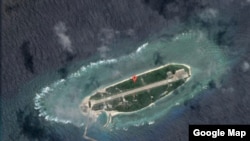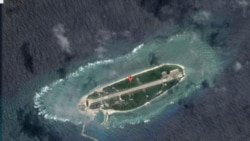There are no islands in the Spratly Islands. Only rocks.
At least, that's according to an international tribunal's ruling earlier this year that said, based on the United Nations Convention on the Law of the Sea, or UNCLOS, Taiwan's "Itu Aba" island is in fact, just a rock. Itu Aba, also known as Taiping Island, is the largest of the naturally occurring Spratly Islands, measuring about 1.4 kilometers long.
The distinction between rock and island is an important one, because according to UNCLOS, rocks are entitled to more than 20 nautical kilometers of territorial waters, while islands produce a 370-nautical kilometer exclusive economic zone (EEZ) and an EEZ gives the rights holder access to fish, oil, natural gas and whatever else may be present. The decision appears to have made no impact on countries' interest in developing their remote outposts in the vast sea.
Taiwan disagrees with The Hague’s Permanent Court of Arbitration ruling, which also rejected China's territorial claims over nearly all of the South China Sea.
Google satellite images
On September 21, Taiwan's Defense Ministry asked Google to blur satellite images of four three-pronged structures arranged in a semi-circle just off the northwestern shoreline of Itu Aba. Some experts said the structures appeared to be new military installations.
In addition to port facilities on Itu Aba and an updated airstrip, what is it that Taiwan hopes to achieve by further developing its facilities there?
John Minnich, senior East Asia analyst with intelligence firm Stratfor, says Taiwan is “keeping up with the game” of building assets in the region as China continues to develop facilities “in the Spratly islands and throughout the South China Sea.” Minnich says, “I think that there are elements in Taiwan’s [government] that want to make sure that Taiwan doesn’t fall behind.”
Scott Harold, associate director of the RAND Corporation’s Center for Asia Pacific Policy, notes Taiwan did not react favorably to the Permanent Court of Arbitration’s ruling that Itu Aba was a rock and that the activity there shows that the current administration of President Tsai Ing-wen actively will protect its claim.
Sea construction
With China, Taiwan, and Vietnam adding to their existing facilities in the South China Sea, has this type of activity now become routine? Harold says not all construction activities are equal.
“The [Taiwanese] and Vietnamese examples are ones where they've done some marginal maintenance and repairs by shoring up eroded sea areas around the coasts of these facilities and certainly putting some capabilities and some installations onto these features; but, what China has done is you know de novo create out of whole cloth new land features that didn't exist before. So, I think in that sense when you know we've not seen Vietnam, Taiwan, the Philippines, Malaysia, or Brunei do what China has done and in the South China Sea.”
“Certainly the Philippines and Vietnam must be looking at Chinese activity in the South China Sea and thinking what China's doing conflicts with their own national interests,” said Minnich, adding, “I think that both countries have a strong interest in ensuring that China doesn't get too far ahead of them in terms of its actual infrastructural capacity in the region.”
Code of conduct
The 2002 South China Sea Code of Conduct says nations wouldn’t "complicate or escalate disputes" and refrain "from action of inhabiting on the presently uninhabited islands, reefs, shoals, cays, and other features."
Scott Harold said the code has done little to change the behavior of some countries in the region.
"The Code of Conduct [is] something that has been violated for a long time and was hopefully going to lead to a permanent Code of Conduct," he said."I think that has been shown to be an approach that China has thoroughly abandoned and rendered inoperable through its actions.”
If the Code of Conduct is inoperable and China continues to build in the region, then Harold says other countries may choose to further fortify their claims.







